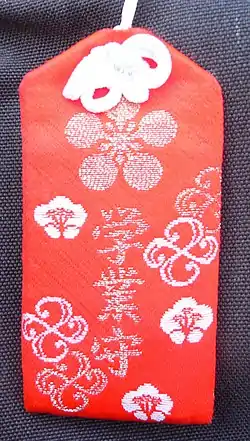御守
Japanese
| Kanji in this term | |
|---|---|
| 御 | 守 |
| お Grade: S |
まも(り) Grade: 3 |
| kun’yomi | |
| Alternative spelling |
|---|
| お守り |

Etymology
Compound of 御 (o-, honorific prefix) + 守り (mamori, “the 連用形 (ren'yōkei, “continuative or stem form”) of verb 守る (mamoru, “to protect, to watch over”)”).[1][2]
See also
- 護符 (gofu): a kind of 御札 (ofuda, “charm, amulet, talisman”) containing a slip of paper with something of protective significance on it, such as a name or picture of a kami or buddha
- 神札 (shinsatsu): an 御札 (ofuda, “charm, amulet, talisman”) sold specifically by a Shinto shrine
- 御札 (ofuda): a charm, amulet, talisman
References
- Shōgaku Tosho (1988) 国語大辞典(新装版) [Unabridged Dictionary of Japanese (Revised Edition)] (in Japanese), Tōkyō: Shogakukan, →ISBN
- Matsumura, Akira, editor (2006), 大辞林 [Daijirin] (in Japanese), Third edition, Tōkyō: Sanseidō, →ISBN
This article is issued from Wiktionary. The text is licensed under Creative Commons - Attribution - Sharealike. Additional terms may apply for the media files.